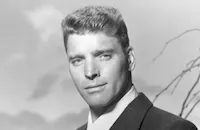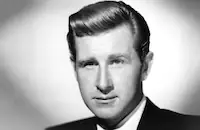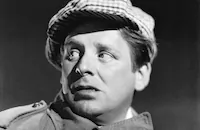The Rainmaker

Brief Synopsis
Cast & Crew
Joseph Anthony
Burt Lancaster
Katharine Hepburn
Wendell Corey
Lloyd Bridges
Earl Holliman
Film Details
Technical Specs

Synopsis
In 1931, with the heartland of Kansas suffering a severe drought, confidence man Bill Starbuck plies his trade as a rainmaker, though he has failed to produce even a single drop of precipitation. After narrowly escaping another angry mob, to whom he has been selling bogus tornado deflectors, Starbuck arrives in the backwater town of Three Point. Although the town was once a prosperous farm community, the drought has killed most of the local crops, as well as much of the townspeople's livestock. Rancher H. C. Curry has problems beyond his dying cattle, however, as his spinster daughter Lizzie has returned home from a week's visit to Sweet River without making any conquests from among her Uncle Ned's three marriage-able sons. H. C., along with his two sons, Noah and Jim, then decide to match Lizzie up with J. S. File, the local deputy. Although Lizzie is agreeable to such an arrangement, File has little interest in romance, having come to accept his solitary life. After declining the Currys' invitation to dinner, File gets into a brief fight with the bumbling Jim, though H. C. strikes the final blow when he tells the deputy that the whole town knows that he is not the grieving widower that he claims to be. That evening, Lizzie is heartbroken to learn that File is not coming to dinner, but the deputy is soon replaced at the Currys' dinner table by Starbuck. The fast-talking confidence man offers to bring rain to Three Point in twenty-four hours, if he is paid $100 in advance. Though H. C. knows Starbuck is a liar, the desperate rancher agrees to the crooked rainmaker's proposition. Arguing that he can only be successful in creating a storm if the family believes in him, Starbuck sends the three male Currys off on bizarre errands, leaving him alone with Lizzie. He soon reduces the skeptical spinster to tears by telling her that she will never be a real woman because of her lack of faith in anyone or anything. Meanwhile, with the encouragement of his boss, Sheriff Howard Thomas, File has a change of heart and decides to go out to the Curry ranch, under the pretext of apologizing to Jim. Instead, he confesses to Lizzie that he is a divorced man, who lost his wife to a near-sighted schoolteacher because he was too proud to ask her to stay. The two then sit down to talk, but the insecure Lizzie finds herself either arguing with File or acting like a brainless idiot. After the deputy literally runs out of the Curry home, Noah confronts his family, stating that Lizzie is plain and doomed to be an old maid. Though she seemingly accepts her elder brother's decree, Lizzie's spirits soon soar on the wings of Starbuck's charm, for he convinces her that she will be beautiful if she believes it. After letting down her hair, Lizzie is kissed for the very first time by Starbuck. She is not the only Curry to finally gain self-confidence, as Jim breaks away from Noah's domineering manner and becomes engaged to Snookie McGuire. Soon after, File returns to the Curry ranch looking for a swindler known as Tornado Johnson. Realizing that Tornado and Starbuck are one and the same, the Currys try to protect the rainmaker from the law, but he is arrested by File nevertheless. After the entire family, including Noah, asks for Starbuck's release, File agrees to let the confidence man go. As he begins to ride off, Starbuck stops his wagon and asks Lizzie to join him. File, however, asks her to stay, and realizing her place is with him, Lizzie remains behind. Starbuck then gives the Currys back their money and rides off, only to have a rainstorm break out. He then rides back to the ranch, collects his money and rides off again, finally a real rainmaker.

Director
Joseph Anthony
Cast

Burt Lancaster

Katharine Hepburn

Wendell Corey

Lloyd Bridges

Earl Holliman
Cameron Prud'homme

Wallace Ford
Yvonne Lime
Dottie Bee Baker

Dan White
Michael Bachus
Stan Jones
John Benson
James Stone
Tony Merrill
Joe Brown
Ken Becker
Crew
John A. Anderson
Harry Arnold
Ralph Axness
R. A. Blaydon
Walter Broadfoot
Frank Caffey
C. C. Coleman Jr.
Carl Coleman
Sam Comer
R. D. Cook
Ed Crowder
Pat Drew
Bob Fender
Gary Fifield
John P. Fulton
Bill Greenwald
Grace Harris
Edith Head
Warren Hoag
Cline Jones
Arthur Krams
Charles Lang Jr.
Winston Leverett
Harold Lewis
Warren Low
Nellie Manley
Ken Meade
Kyme Meade
Curtis Mick
Hedy Mjorud
Tish Morgan
Eddie Morse
Richard Mueller
N. Richard Nash
Paul Nathan
Paul Nathan
Alex North
Gordon Palmer
Hal Pereira
Tony Regan
Bob Simpson
Jack Souper
Jack Stone
Walter Tyler
Marvin Weldon
Wally Westmore

Videos
Movie Clip


Film Details
Technical Specs

Award Nominations
Best Actress
Best Score
Articles
The Rainmaker
Both these characters resemble other, more famous ones played by the same two stars. Lizzie Curry is in many ways another version of Jane Hudson, the character Hepburn had played to Oscar®-nominated success in the previous year's Summertime (1955). Starbuck, meanwhile, can be seen as something of a dry run for Lancaster's masterful Elmer Gantry three years later, in the movie of the same name.
The Rainmaker is the only picture in which Hepburn and Lancaster ever teamed up, and they had something of a rocky start due mainly to their opposite approaches to acting. Hepburn was the polished professional, learning her lines entirely before production began; Lancaster preferred to learn each day's script the night before shooting. When Lancaster was 25 minutes late to the set on the first day of production, Hepburn yelled at him in private. From then on, he was on time and both stars turned in excellent performances, even working hard together to revise (over the author's objections) a key scene in which Starbuck gives Lizzie her first-ever kiss. After viewing rushes of the scene, producer Hal Wallis wrote in a memo: "I never dreamed that Lancaster could be this great an actor." (The MPAA found some problems, however: some members insisted that the sequence implied that the two characters had had sex, and most felt that generally the story constituted "a glorification of illicit sex." In the end, the scene remained.)
Lancaster proved especially difficult for everyone to work with, though all agreed he was great for the part. Lancaster owed Paramount producer Wallis two more pictures on his contract, and when he heard that The Rainmaker was being turned into a film, he asked to read the script. Author Nash was quite excited to hear this, writing to Wallis, "There is no actor who combines more fully the attributes of romance, agility of mind and body and pungent sexuality. Matter of fact, I like him even better than Brando for this part. For Lancaster is more open, healthier, less turned inward upon himself." Lancaster saw that this was a plum role and told Wallis that if he could play Starbuck, he would also make for Wallis the big, crowd-pleasing western Gunfight at the O.K. Corral (1957). Wallis agreed, though in the end Gunfight was filmed first and released second.
By the time he finished filming Gunfight, Lancaster decided he wasn't that crazy about The Rainmaker anymore, calling it "a bunch of crap." He was clearly nervous about working with inexperienced director Joseph Anthony, a veteran theater director making his film debut. (He had staged The Rainmaker on Broadway.) Lancaster tried to take charge on the set, ordering around the cameraman and lighting technicians much to the anger of Anthony, who had a hard time controlling the star.
"He was very difficult from the outset," recalled Anthony later. "He was anxious to get out of his contract with Hal Wallis; he was terribly antagonistic on the telephone before we met and at our first meeting; he told me, 'This play is a bunch of crap. The writer doesn't know anything about country life, or what it means to be in a drought, with the cattle starving.' I told him the drought was just a symbol of Lizzie's parched soul, but he dismissed the idea out of hand... He was not much fun to work with."
Anthony's rapport with Hepburn, on the other hand, was the total opposite: "She called me at the very outset of negotiations from Cuba [where she was living with Spencer Tracy as he filmed The Old Man and the Sea, [1958], and said how happy she was she would be working with me. I had a sense of immediate, direct, simple pleasure, and a feeling of trust in me that came over the wire."
Hepburn biographer Anne Edwards later wrote that due to Joseph Anthony's background as a dancer, "The Rainmaker took on a balletic as well as a balladic quality. Never had Kate moved so well as under Anthony's graceful direction. Her mannered movements and cracked voice were smoothed into a swell of loneliness that, when it erupts at the climax of the film, has great impact... Kate's performance was the most restrained of her career, and it gave her scenes with Lancaster, as the swaggering pitchman, a startling force."
One thing that Hepburn didn't do in playing Lizzie was to accent her voice. She had failed to convey the right accent and manners of an uneducated rural woman in an earlier film, Spitfire (1934), and evidently decided not to risk sounding strained once again.
It didn't matter. Hepburn received her seventh of twelve Best Actress Oscar® nominations, losing to Ingrid Bergman in Anastasia (1956). She would ultimately win the award four times over her career. The Rainmaker composer Alex North, meanwhile, racked up his sixth of fifteen nominations, losing to Victor Young for Around the World in 80 Days (1956). North never won an Oscar® for Best Score, instead receiving the consolation prize of an honorary Academy Award® in 1986.
Producer Hal Wallis called Katharine Hepburn his favorite of all the actresses he ever worked with, citing her "intelligence, talent, dignity, integrity, wit and humor... The most down-to-earth legend I ever met... She is an untapped mine of inner resources: never feels sorry for herself; never complains; never lonely; never at a loss for living."
Cameron Prud'Homme recreated his stage role of Lizzie's father for this film. In 1963, The Rainmaker was reworked by author Nash into a Broadway musical entitled 110 in the Shade which Joseph Anthony also directed.
Producer: Paul Nathan, Hal B. Wallis
Director: Joseph Anthony
Screenplay: N. Richard Nash
Cinematography: Charles Lang
Art Direction: Hal Pereira, Walter H. Tyler
Music: Alex North
Costume Design: Edith Head
Cast: Burt Lancaster (Bill Starbuck), Katharine Hepburn (Lizzie Curry), Wendell Corey (Deputy Sheriff J.S. File), Lloyd Bridges (Noah Curry), Earl Holliman (Jim Curry), Cameron Prud'Homme (H.C. Curry), Wallace Ford (Sheriff Howard Thomas).
C-122m. Letterboxed.
by Jeremy Arnold
Sources:
Kate Buford, Burt Lancaster: An American Life
Minty Clinch, Burt Lancaster
Anne Edwards, A Remarkable Woman: A Biography of Katharine Hepburn
Charles Higham, Kate
Alvin H. Marill, Katharine Hepburn
Hal Wallis and Charles Higham, Starmaker

The Rainmaker
Quotes
I don't believe in rainmakers.- H.C. Curry
What DO ya believe in mistah? Dyin' cattle?- Bill Starbuck
Trivia
Loosely based on the real-life story of rainmaker Charles M. Hatfield.
Elvis Presley took his first screen test for this movie, which led to reports that he was considered for a role as his movie debut. At least one source (the book "Elvis: His Life from A to Z" by Fred Worth and Steve Tamerius) says that this was not the case, although in an interview in 1956, Elvis did say that thisr was going to be his first movie.
Notes
According to Hollywood Reporter, producer Hal Wallis purchased the film rights to N. Richard Nash's play The Rainmaker for $300,000 in February 1955. New York Times reported that RKO had previously attempted to purchase the film rights to the play in August 1954, prior to its Broadway production. Joseph Anthony directed the play's original production, which ran for 124 performances, before directing the film adaptation. Actor Cameron Prud'Homme reprised his stage role of "H. C. Curry" in the film. The Nash play was later musicalized in 1962 as 110 in the Shade. On July 6, 1955, Hollywood Reporter's "Rambling Reporter" column stated that Wallis was negotiating with Daniel Mann to direct the picture.
According to modern sources, William Holden was originally cast in the role of "Bill Starbuck." When Burt Lancaster read in Hedda Hopper's column that Holden had backed out of The Rainmaker, he called Wallis, agreeing to appear in the producer's 1957 production of Gunfight at O.K. Corral (see entry above) if he received the title role in this film. Modern sources add that Katharine Hepburn, having been so impressed by the actor's performance in Paramount's 1955 production The Rose Tattoo , wired Wallis a congratulatory note for casting Lancaster as Starbuck. As confirmed in surviving footage of tests and outtakes for the film, Elvis Presley did a screen test for "Jim Curry," which would have been his first acting role. That part was played in the film by Earl Holliman.
The Rainmaker received two Academy Award nominations: Hepburn was nominated for Best Actress (for the seventh time in her career, up to that point), while Alex North was nominated for Best Music Score. In May 1982, Hollywood Reporter reported that Nash was taking legal action to challenge Paramount's right to do a video production of his play for the cable television network HBO. Paramount argued that, by taping the play in front of a non-paying audience, they were legally within the remake rights established in the studio's agreement with the playwright prior to production of the 1957 film. Nash, having retained the play's theatrical rights, argued that the HBO production was a commercial production of his play, not a remake of the film. It has not been determined if Nash lost his suit or reached a settlement with Paramount, but the HBO production was taped and aired on October 22, 1982, starring Tommy Lee Jones and Tuesday Weld under the direction of John Frankenheimer. The play was revived on Broadway (11 November 1999-23 November 2000) in a production directed by Scott Ellis and starring Woody Harrelson.

Miscellaneous Notes
Released in United States on Video October 12, 1988
Released in United States Winter December 1956
VistaVision
Released in United States on Video October 12, 1988
Released in United States Winter December 1956













